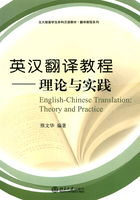
5.11 语域理论的应用
语域理论的应用有助于译文体现原作的风格。细细品味下面的几段译文,我们不难拟构出有关的上下文、想象出交际者、对象、场合和方式等方面的情况。错误语域的选择,会使译文失去其得体性。
◇ Gerson to Pelé; a brilliant pass, that.And the score still: Brazil 4, Italy 1. 32 The ball in-field to-oh, but beautifully cut off, and...
格逊把球传给了比勒,好一个漂亮的传球,那是——!现在巴西队与意大利队的场上比分还是4: 1。场上的球踢给了……啊,拦截得真利落……
(足球赛现场解说)
◇ Well, I could step in on the way home.Means I'd be a bit late though. What's the address? You're quite sure that's where he lives? Right. Bye for now.
这么着吧,回家时我顺道拐进去瞧瞧,就是说得晚点到家。他住在哪儿来着?你肯定他就住在那儿?好吧,回见!
(下班前给妻子打的电话)
◇ Must cancel visit seventeenth +Impossible obtain flight +Booked following day +Arrive airport ten morning +Sorry upset plans +Please meet +Stanley
非退17日的票不可,航班难订,已订次日票,上午10时到,打乱计划,歉甚,请接,斯坦利。
(电报)
◇ Ingredients:150 g beef tenderloin,100 g onion; Seasonings: 1/2 tsp.salt, 3/4 tsp.Sugar, dash pepper, 1/2 cup water.Cut the tenderloininto thin strips and shred onion.Heat the pan for 6 minutes, add 2 tsps.oil, cook the onion until lightly brown.Add beef and fry it for 5minutes.Serve immediately.
配料:牛柳150克,洋葱100克;调料:盐半茶匙,糖四分之三茶匙,胡椒粉少许,水半杯。把牛柳切成细长薄片,把洋葱切成丝。将锅烧热六分钟,加入食油两茶匙,爆香洋葱至淡黄色。加入牛柳,爆炒五分钟即可食用。
(烹调指南)